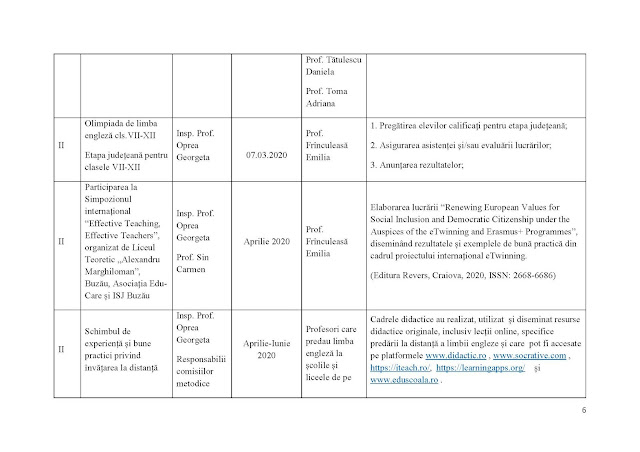Saturday, 29 August 2020
Thursday, 27 August 2020
“Renewing European Values for Social Inclusion and Democratic Citizenship under the Auspices of eTwinning and Erasmus+ Programmes” (2020-2022)
The recently approved eTwinning project “Renewing European Values for Social Inclusion and Democratic Citizenship under the Auspices of eTwinning and Erasmus+ Programmes” (2020-2022) is about promoting common values, social inclusion and equity, civic engagement and responsible citizenship in 21st century schools around Europe, while reinforcing the development of key competences and enhancing the role of educators through Erasmus+ project-based learning, teaching and training activities. The project will also re-assess the role of formal education and re-consider the importance of non-formal learning and training opportunities. Flipped teaching, blended learning, learner-centered activities, civic and cultural lessons will generate reversed roles between the teachers and the students, as well as more assertive, persuasive and emphatic participants, able to articulate their opinions and needs, better advocates not only for themselves, but also for others, more tolerant future European citizens willing to listen to reasonable arguments and able to accept different points of view.
The main aims of the project are:
- to facilitate the building of an extensive educational network on eTwinning for genuine collaboration, student empowerment, exchange of good practices and effective dissemination and exploitation of results of an Erasmus+ KA 201 project implemented in 4 countries: Poland, Italy, Turkey and Romania;
- to develop the participants' critical and creative thinking, cooperative skills, linguistic competences, intercultural and digital skills;
- to create learning and development opportunities for disadvantaged students, better trained teachers and more inclusive schools and local communities;
- to promote the fundamental values of the EU, democratic citizenship attitudes and beliefs;
- to involve a significant number of members of the most vulnerable groups in each community (from socially isolated backgrounds, students affected by poverty, children whose parents are working abroad, students belonging to the Roma minority, immigrant or remigrant students who find it difficult to fit in, students at risk of failing or dropping out, students with disabilities or medical conditions, victims of bullying, segregation, marginalization, exclusion);
- to compare knowledge, skills and teaching styles with European peers, explore innovative teaching methods and strategies and manage peer feedback;
- to cultivate and preserve the integrity, diversity and, ultimately, the spirit of European tradition.
The eTwinning project agenda will follow the official calendar of the Erasmus+ project -“Renewing European Values for Social Inclusion and Democratic Citizenship” (2020-1-PL01-KA201-081404) which involves not only Learning, Teaching, Training activities (in Romania, Poland, Turkey and Italy), but also local educational activities which will take place every month in each partner school. The local activities will be announced at the beginning of each month and all the eTwinning project members are invited to participate, not only the direct beneficiaries of EU funding. Feedback, evidence and results will be shared on the project Twinspace to strengthen the European dimension of strategic cooperation between the participating schools.
The most important expected results are: at least 4 European communities involved in strategic international cooperation, better informed communities, more inclusive, equitable and solidary school environments, improved civic and social skills, democratic participation, increased awareness of social inclusion and active democratic citizenship and a virtual portfolio of innovative, yet accessible and ready to use LTT resources, dissemination materials and success stories.
Saturday, 22 August 2020
The eTwinning project "Values Matter" (2019-2020)
The eTwinning project "Values Matter", founded at the beginning of the school year 2019-2020, was implemented in schools located in 5 European countries (Italy, Romania, the United Kingdom, the Republic of Moldova and Ukraine) by 8 eTwinning teachers.
The main aim of the project was, on the one hand, to develop the critical and creative thinking of the participants aged between 6 and 16 years old and, on the other hand, to create learning opportunities and original teaching materials in order to raise awareness of the importance of moral values in terms of personal development and the quality of interpersonal relationships.
Monday, 3 August 2020
Saturday, 1 August 2020
Bibliography List of Sources Used for Teaching English (2019-2020)
1. Evans, Virginia 2002, Successful Writing, Express
Publishing;
2. Harmer, Jeremy 2001, The Practice of English Language
Teaching, Pearson Education Limited;
3. Scrivener, Jim 2008, Learning Teaching, Macmillan;
4. Swan, Michael 1996, Practical English Usage, Oxford
University Press;
5. Vince, Michael 2007, English Grammar in Context
Intermediate with Key, Macmillan;
6. Vince, Michael, Advanced Language Practice, Third Edition,
Macmillan;
7. Vizental, Adriana, 2014, Metodica Predării Limbii Engleze, Ed. Polirom;
8. Common European Framework of Reference for Languages:
Learning, Teaching, Assessment (CEFR) /Cadrul European Comun de Referință pentru Limbi/ https://www.coe.int/en/web/common-european-framework-reference-languages
.








